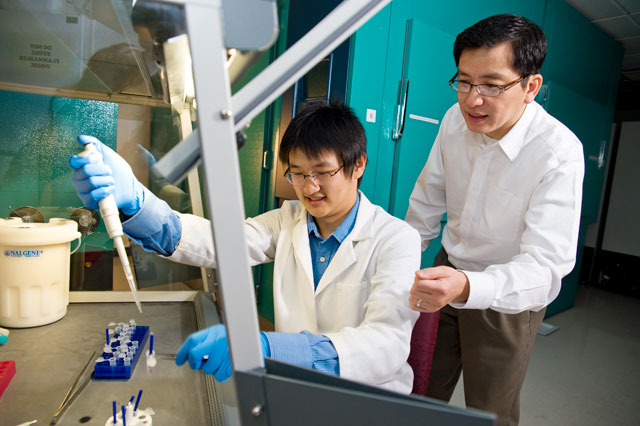
The award also seeks to bolster microbiology research at the undergraduate level.
As part of his award, Cheng received a $4,000 stipend to continue his research into tick-borne disease. Jianmin Zhong, professor of Biological Sciences, is Cheng’s mentor on the project titled: “Study of Prevalence and Transmission Routes of Rickettsia species in _Ixodes pacificus_ by Real-time PCR.” Cheng will travel to Florida to present his results to society members at their 2012 General Meeting.
Although the subjects of his research are microscopic – or smaller – Cheng’s research could have huge implications.
“Thirty thousand people in the U.S. contract a tick-born disease every year,” Cheng says. “Take lyme disease, for example. It’s irreversible. It’s hard to diagnose. And it can cause heart problems and memory loss. We want to develop this system to reduce the tick population or prevent it from spreading disease.”
In his research, Cheng is studying the transmission routes of the Rickettsia species of bacteria in ticks through a process, Real-time PCR, or polymerase chain reaction, which amplifies DNA for closer examination. So far, he has found a symbiotic relationship between the bacteria and the tick. Being able to break the relationship between the tick and the bacteria could mean reducing or preventing the spread of tick-born diseases, he says.
Cheng, a student from the People’s Republic of China, came to Humboldt State on an exchange program in 2008. “I had 22 choices for which college I wanted to attend in the U.S.” Cheng says. “Humboldt has a very good Biology program – and, when I saw it online, I thought it was beautiful. It has a good atmosphere.”
In his time at HSU, Cheng has been active in the Cellular Molecular Biology Club, serving as Vice President in his first year on campus. He has also participated in an undergraduate research internship at the Forsyth Institute of Harvard University School of Dental Medicine.
The opportunity to do hands-on research is one of the biggest things Cheng loves about attending HSU. “In China, you just absorb what the teacher says,” Cheng says. “Here, you’re doing real research that can be published and can actually benefit people.”
Easing the suffering of others has been a lifelong drive for Cheng, whose parents have both worked in the medical field. His mother worked as a pharmacist and his father is an editor and writer for a medical journal. In addition to sparking his interest in medicine, they taught him the value of human compassion.
“My parents educated me with love,” Cheng says. “When I see people suffering, the feeling comes out naturally – I want to help them.” He plans to use his career as a medical researcher to do just that.